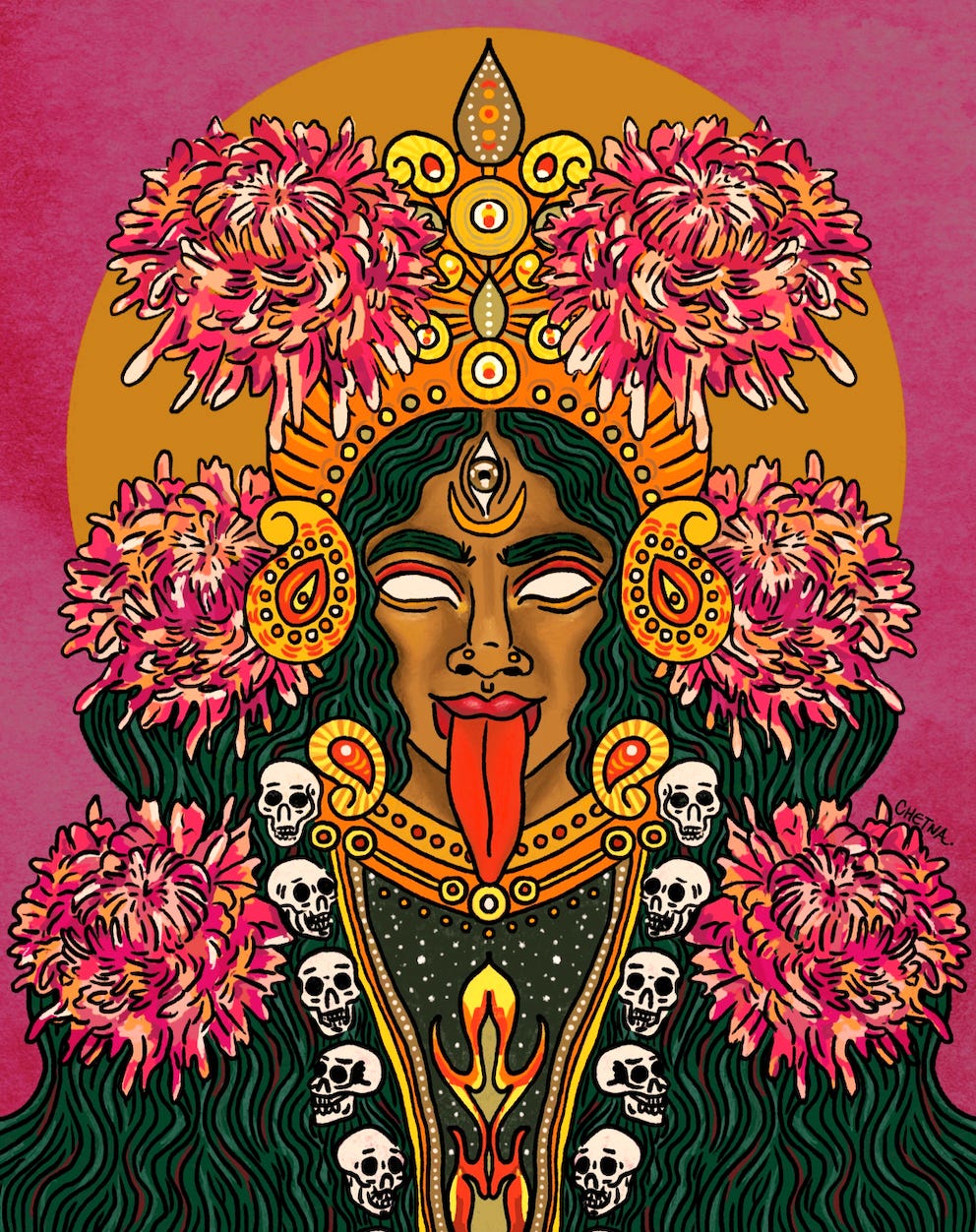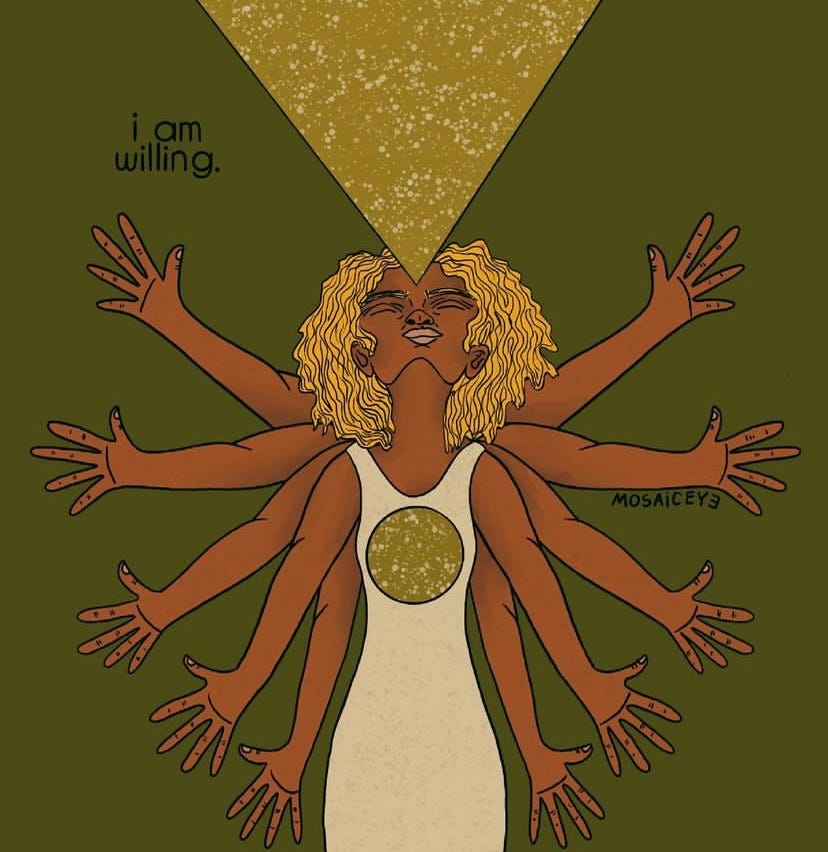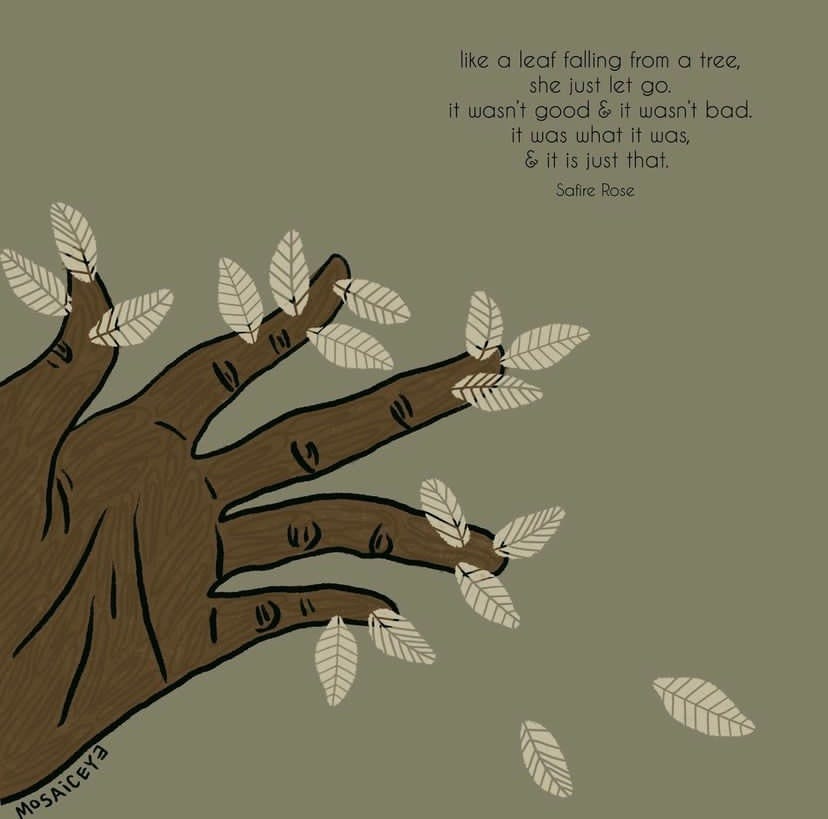All my best writing in this publication is free for you, though here are some other lovely ways to continue receiving and giving to the sustainability of this work:
Apply for a discovery call to work with me 1:1 for your Creative Alchemy™
Get a poster to adorn your space with compassionate reminders
Get a book on abundance mentality and/or playful devotion
Share this publication with people you love
Join a live community circle
Become a paid subscriber
Thank you 💚
I was recently in a suburb of Sydney, Australia for a family wedding.
Day 2 of the 4-day Indian wedding involved an elaborate prayer ceremony called the Piti or Mandhvo to cleanse the groom with haldi (turmeric) before his wedding day.
Dressed in a vibrant orange sari (which took my Pratiba Foi and a friend to help me put on), I hopped in the car with my aunt and uncle to head over to the ceremony.
My mom, who was already there, called right then on behalf of my aunt- the mother of the groom- to tell me that I can’t come because I’m menstruating (which makes me “unclean” for such an occasion).
Just days prior, I was reciting a poem by enthusiastic request from my family to my family about patriarchy and intergenerational healing in our culture…
“…It is amazing that
trees can grow
even in spaces where
the blood from a yoni
brands a menstruating body
with a scarlet letter “F” for
filthy, unwelcomed for prayer…”Alchemizing Fruit
a spoken word about patriarchy and intergenerational healing in South Asian culture
So when this very thing was collectively reinforced, I was pissed.
Feeling left behind and seemingly without choice, I felt anger and resentment. This resentment felt righteous, valid, and protective like Kali Ma. It swooped in to defend my bleeding body and my right to communal prayer despite my moon cycle- which by the way, my Creator gave me as a cleansing mechanism in and of itself 🩸.
Resentment is defined as “bitter indignation at having been treated unfairly.” Psychologists say that resentment sometimes stems from a sense of injustice or unfairness. Holding onto it can feel like a way to seek justice or validation. Perhaps that’s why resentment can feel so sticky, like hot, hot jalebi.
While I felt like I righteously had my own back with the resentment, it also left me with blaming and judgmental stories of others that only fueled my isolation, closed-heartedness, and bitterness.
In this energy, the day progressively got worse. I continued to stew in my anger and I couldn’t easily eat my feelings with any good food available on the Easter holiday in the business district I was staying in. Then, I fell off a tree I was climbing at the park and hit my head…ugh!
With scabs on my legs, a swollen head and heavy heart, I had to alchemize the resentment.
This is how I practiced (and continue practicing) releasing resentment:
1. I non-judgmentally recognize the felt-sense of resentment and fear brewing in me
I observe how resentment feels in my body and how my body feels in resentment.
2. I acknowledge my resentments by writing them down and more importantly, naming my fears associated with them.
(I learned this practice from Anna Runkle, who shares a great free class on this “daily practice”), and follow this format: “I have resentment with/at/against _____ because I fear that _____.”
3. I give up my resentments and fears to a Higher Power.
To God, the land, the Universe, etc.
1. I non-judgmentally recognize the felt-sense of resentment and fear brewing in me
I observe how resentment tightens my neck and jaw, or gives me a dull ache in my chest; how my bum clenches and how my forehead crinkles. I see how it makes me avoid eye contact with others, how resentment feels lumpy in my throat, how it curls my shoulders around my heart for protection, and how it cycles thoughts and judgments in my mind like a gerbil running on a wheel.
I notice these sensations and energies of resentment (and fear), without making it bad or good or anything beyond what just is.
2. I acknowledge my resentments by writing them down and more importantly, naming my fears associated with the resentments.
I learned this practice from Anna Runkle (who shares a great free class on her daily practice) and follow this format of naming my resentments:
“I have resentment with/at/against _____ because I fear that _____.”
I have resentment with the women in my family who said I couldn’t go to the Mandhvo because I fear that they are the most heart-breaking reinforcers of patriarchal bullshit and when it comes down to it, they don’t have my back (and we don’t have each others’ backs).
I have resentment at the men closest to me who scoff, roll their eyes or laugh it off when I talk about how pervasive the harm of patriarchy is because I fear that they will never understand or empathize with me, and that they are happy to reinforce bullshit so long as they keep their privileges.
I have resentment against these stupid beliefs that people just go with because I fear that when I speak out against, disrupt, or challenge them, I become too difficult, disrespectful, annoying or harmful to connect with and belong.
This format is so important because it makes aware to us more of the root beneath resentment: FEAR. Fear of not being protected or allied with, fear of being misunderstood or judged instead of empathized with, fear of not belonging.
When I see the root fear beneath the reactive resentment, I see how utterly and vulnerably human these fears are, and that they have holes in them- they may feel real but they’re largely untrue or at least not fixed.
3. I give up my resentments to a Higher Power.
This part is the most beautiful. After I’ve written down any and all fears and resentments that come up, I sign it off with something that sounds and looks like this:
Dear God, I am ready and willing to let go of these resentments and fears. I do not want to carry them any longer, I do not need to hold them. I give them up to you.
Please take these fears and resentments and do what you do to compost and alchemize them. Please free me from them in mind, heart, body and spirit.
May I be free. May everyone I mentioned be free. May we all be free. Thank you, thank you, thank you. Om shanti, shanti, shanti.
And what I find again and again is that these resentments and fears become less sticky, and I am more readily able to let them go. When I name them without judgment, identify the fears beneath them, and choose to give them up with trust in God, a Higher Power, the land or stars, there is alchemy.
In this letting go, I feel a felt-sense of freedom and lightness. My nervous system regulates and I access my capacity to reengage socially, to advocate for my needs and feelings without the bitterness or expectation. I can be honest and loving with myself and those around me, in our spectrum of humanity.
In the case of missing the Mandhvo due to my holy menstrual blood, my dad had thought about the Alchemizing Fruit poem even while this was happening and assumed I’d probably playfully write another poem about this experience. In a way, he wasn’t wrong (thanks for reading this here ;p), but it’s about so much more than that.
I did express my disappointment and grief (which was beneath the anger and resentment) with my mum, aunts, uncles, brother and dad…and then I forgave what happened and enjoyed the interactions and events of the trip and wedding thereafter.
I’m choosing to write about it here because it was a very recent and relevant experience of resentment rising up to encompass so much of me, and practicing a way to reclaim my heart, love and freedom.
Even as I commit to challenging patriarchal systems and beliefs every day, I am lighter and in Love when I practice naming my fears and resentments, and letting them go again and again.
Despite on-going oppressive circumstances on so many levels, this frees up my energy and allows me to embody the liberation I want for us all.
If you’d like support to name and release your resentments and fears to free your love:
May we all be Free in our Love,
Chetna








